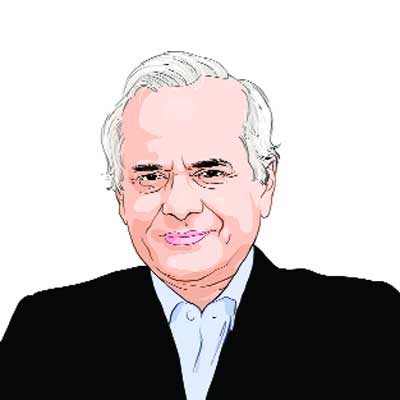Opinion The risks and rewards of connection
As the Gulf spill and the financial crisis revealed,innovation and communication technology arent all we need...
On a long haul flight from New York to Mumbai,I recently flipped through a book by Matt Ridley,a zoologist and the former editor of The Economist magazine,calledThe Rational Optimist How Prosperity Evolves. The central thesis of this book is that the extraordinary evolution of Homo sapiens has happened not simply because they have bigger brains than other animals and the facility of language,but because at some point in the prehistoric past their brains began to interact with each other,ideas began to meet and mate and the conditions were created for the specialisation of skills,the division of labour and the exchange of goods and services.
The consequential development of a collective intelligence ten individuals could know between them ten things while each understanding only one triggered innovation and innovators. It also allowed people to access goods that they did not know how to make and knowledge that they did not generate themselves. Ridley argues that innovation is an unending process new ideas cannot be throttled and that innovators will inevitably find responses to the contemporary challenges of pandemics,global warming,poverty,etc. His prediction for the rest of the century is unambiguously robust. Prosperity spreads,technology progresses,poverty increases,disease retreats,fecundity falls,happiness increases,violence atrophies,freedom flows,knowledge flourishes,the environment improves and the wilderness expands.
I have to say that after a week in the US where the only conversation was about the environmental consequences of the blowout in the Gulf of Mexico and the financial crisis in the Eurozone countries,I had difficulty sharing Ridleys optimism. I understood the logic that technology and trade had been the principal drivers of mans evolution but I questioned whether they would necessarily remain so in the future. In fact it seemed to me that given the environmental and financial problems that were on everyones mind,a fundamental question had to be addressed: Has the reach of innovation exceeded the grasp of the innovators?
The technological breakthrough that has enabled petroleum companies to explore and produce oil/gas from deep waters offshore has undoubtedly contributed to meeting energy demand. Huge reserves of hitherto inaccessible hydrocarbons have been unlocked and the consequential increase in production has been significant. In 2000,for instance,the total production from the deep water was 1.5 million barrels a day (mbd). This has gone up to 5 mbd today and given that a large proportion of the recent new discoveries have been made in the deep waters,this figure is expected to double to 10 mbd by 2015. In the US,deep water production accounts for 30 per cent (1.6 mbd) of its total domestic production (5.3 mbd).The positives of this technology cannot be questioned. But equally there can be no denying the risks and uncertainties that these breakthroughs can generate. The BP well,for instance,is below one mile of water. No person can swim down to this level. The efforts to control the leak has to therefore be carried out through remote control. This has to have compounded the challenge.
We all know the financial crisis was triggered by the subprime mortgage fiasco in 2008. Wall Street alchemists converted subprime loans into tranches of marketable securities and through,inter alia,the creation of impossibly complex financial instruments,spread their magic through the Western banking system. We also know,with the benefit of hindsight,that these transactions were fundamentally unsound. What we do not perhaps fully understand is why the warning signals were ignored. Why was it that the progenitors of such complex financial tools so complex that only those with genius level IQs could comprehend,failed to react to conventional signals of implosion. I do not know the answer,but I would not be surprised if someone told me that having created the alchemy,these geniuses abdicated their collective intelligence to mathematical models and financial tools.
The crisis happened because people forgot the critical assumptions and weaknesses that underlay these models. They lost control their own creation. The recent divine shattering announcement by Craig Venter and Hamilton Smith the two American biologists who first decoded the DNA sequence of a living organism (a bacterium) in 1995 that they have now created a bacterium with an artificial genome (i.e. no ancestor) has also the potential of cascading out of control.
The point of these three examples is to compel reflection on technology and innovation. The physical and scientific world are now so interdependent,and knowledge is so abundantly available that ideas can mutate in ways that are not always beneficial. Safeguards must therefore be built in to ensure the rippled impact of new ideas do not lead to social,political or environmental problems.
What might be those safeguards? It should not be to ban or restrict innovation or innovators. Nor indeed to put a check on the flow of knowledge (even if in todays internet age that were possible). It could be to tighten regulatory and monitoring mechanisms. I think the most effective safeguard would be to compel innovators to filter their ideas through the test of whether it reinforces the positives of interdependency and/or reduces the negatives,and in particular,whether it contributes to correcting the current conditions of instability,inequality and unsustainability. Ridleys historic sweep shows that the exchange of ideas can overcome the harshest of challenges. Contemporary reality shows that innovators are not beyond tampering with what should not be touched. They can get too big for their boots. Decision makers must be driven to realise Ridleys future but at the same time to ensure that hubris does not bring with it nemesis.
The writer is chairman of the Shell group in India. Views are personal





